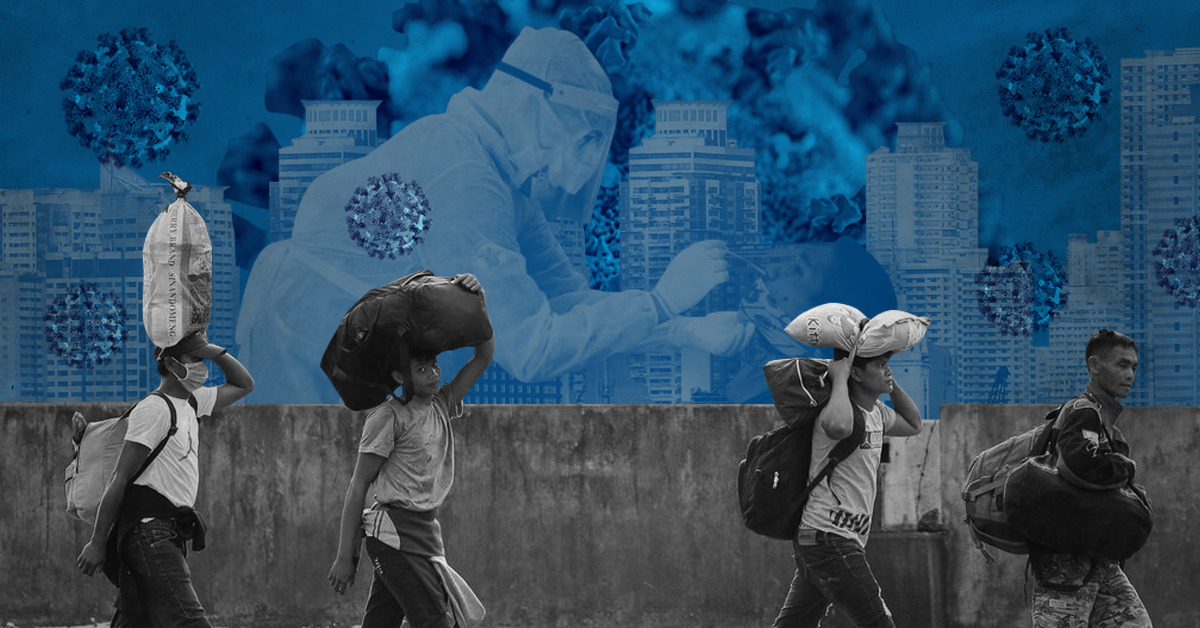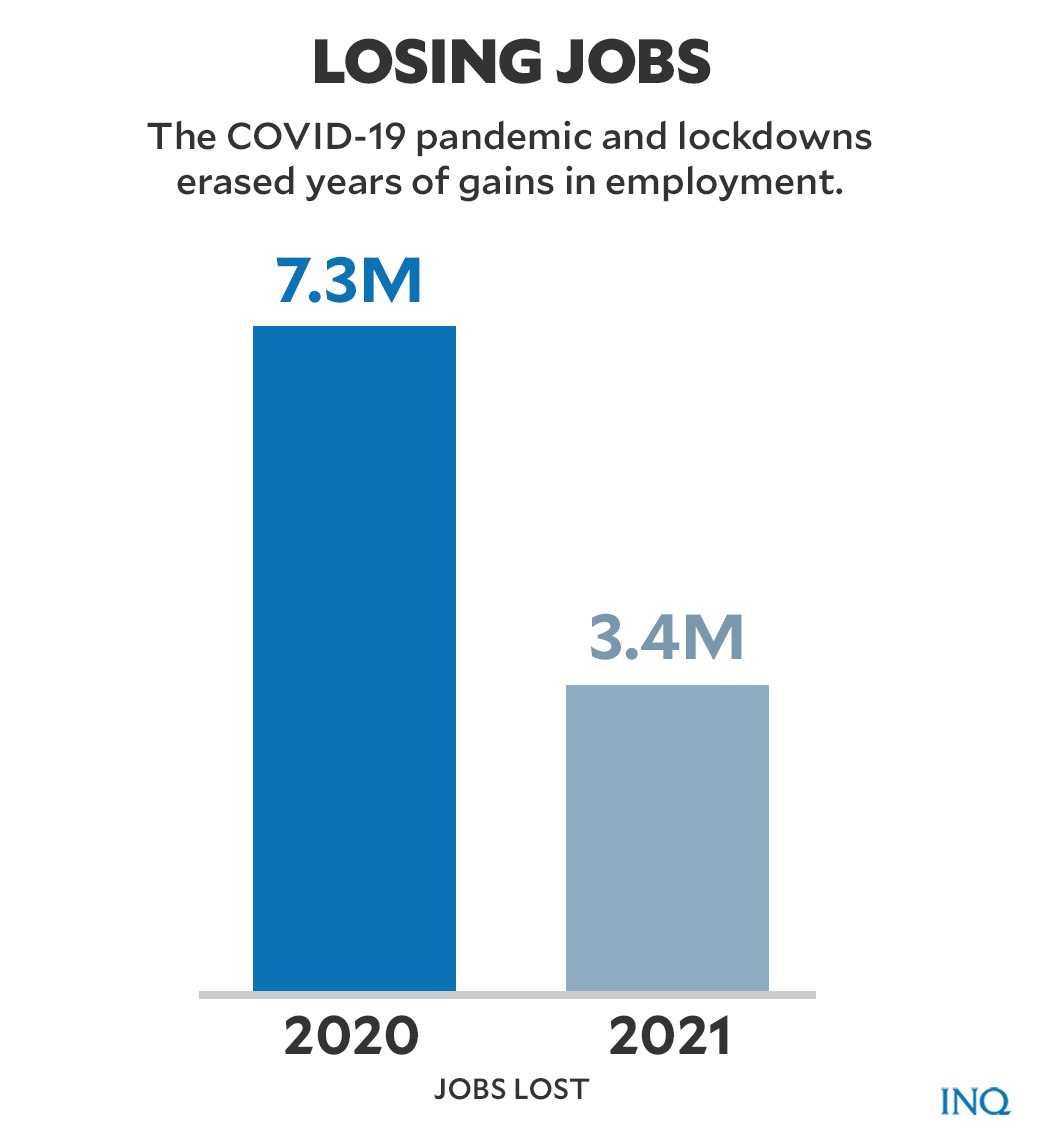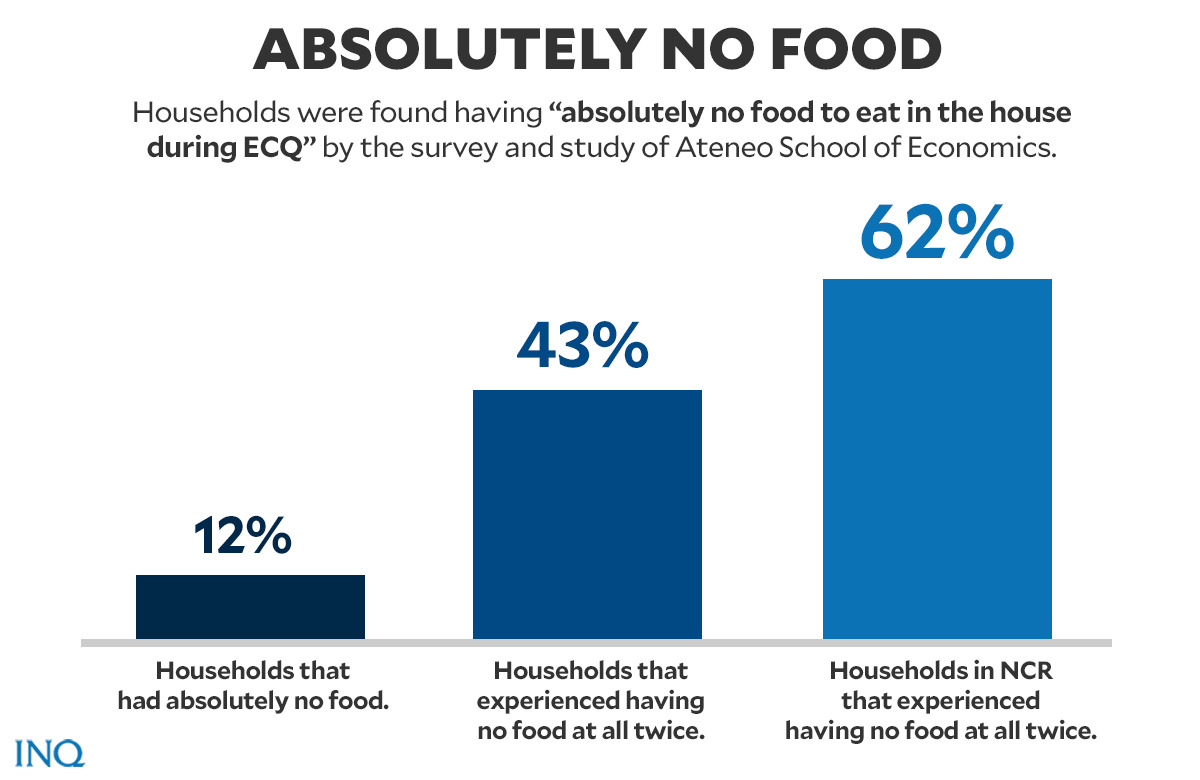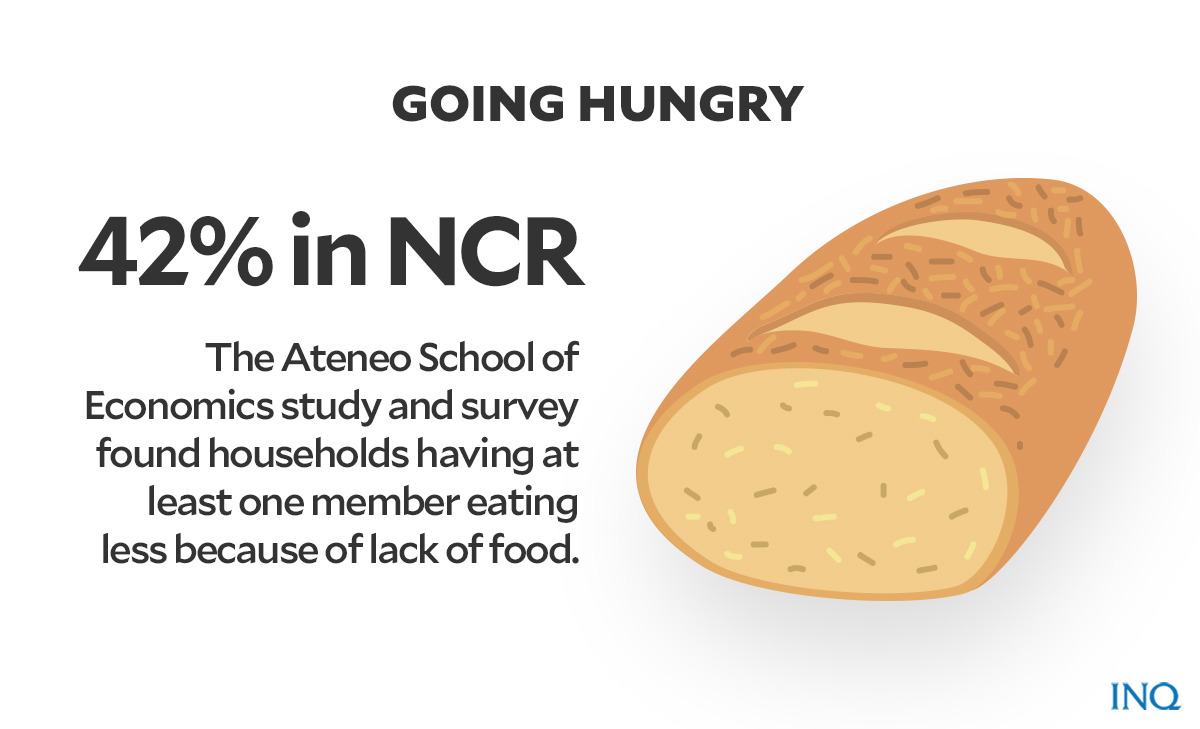Pandemic in PH: Misery beyond numbers
MANILA, Philippines—The COVID-19 pandemic and measures taken to stop transmission of SARS Cov2, the virus that causes the disease, have driven up to 7.3 million Filipinos out of their jobs in 2020, starting at the height of movement restrictions in April that year.
The unemployment rate zoomed to 17.7 percent at that time, the highest since 2005.
When a new surge of COVID-19 cases went on a rampage in 2021 in the National Capital Region (NCR) and another round of restrictions was imposed, at least 3.4 million Filipinos lost their jobs, according to government data.
The numbers, however, don’t tell the story of Dina, 23, who came to Metro Manila in 2019 to find a job as a mall contractual employee to help her family in Leyte province and is now working just three days a week.
Article continues after this advertisementThe numbers also don’t tell the story of Agnes, 34, a restaurant worker and single mom who was laid off for several weeks then took a hefty pay cut when she returned to work with reduced hours, her worst experience after working for more than five years already.
Article continues after this advertisementThey don’t tell the story, either, of Ryan, 29, a grocery store bagger, who has four children and had to beg his employer of three years, a labor contracting firm, to give him work at least four times a week.
Dina rents bed space in Baclaran, Paranaque City and works at a mall in Pasay City. She gets about P570 per day as a minimum wage earner. She pays P1,250 monthly for bed space in a boarding house that has only two toilets and bath for at least 20 residents. She sends at least a third of her earnings to her family in Leyte every payday. She can’t cook in the boarding house so she eats out every day, keeping her food expenses to not more than P100 a day. She spends at least P80 daily on transportation. Life was tough already.
When the pandemic struck in 2020, stores at the mall were forced to temporarily close as only those considered essential were allowed to continue operating under enhanced community quarantine (ECQ), the most stringent form of lockdown in the Philippines. The department store, where Dina works as a saleslady for a shoe brand for women, closed stripping Dina of her only source of income.
A dark room in a dark night
“It felt like the lights went off in your room in a dark night,” Dina said in a phone interview, describing her reaction to being laid off, speaking in Filipino. “I thought immediately about my family,” she said.
Like countless of others who suffered the same fate because of the pandemic, Dina resorted to borrowing money to make ends meet—from friends, co-workers, her bosses, distant relatives, others willing to help. She was not on the list of persons qualified for the government’s 4Ps, or cash subsidy, program so she didn’t get any cash aid distributed by the government during the first round of ECQ.
She had hoped to receive cash from the aid program drawn by the Department of Labor and Employment (DOLE) for displaced workers but her employer had failed to work on papers to qualify for it.
“I don’t know how I survived,” Dina said.
When the 2020 ECQ eased into general community quarantine, the looser form of lockdown, the department store Dina works at reopened but with reduced capacity. Not all its workers could resume a five-day work week so Dina found herself alternating for work hours with her co-workers. A shifting arrangement gave Dina three days of work each week, two days less than she had prior to the pandemic. Life became tougher.
To save on expenses, Dina decided to forego transportation and just walk the more than 3-kilometer distance from her boarding house to her workplace in Pasay City. She begged for a reprieve in monthly bed space rent as did nearly everyone renting similar space in the boarding house where she stays. On some days, Dina skips meals, eating only once a day and drinking water at nights to fight the hunger pangs.
“I’m getting used to getting hungry,” Dina said, letting out a pained, brief laughter.
But Dina hasn’t hit bottom yet.
Depths of suffering
When a new round of ECQ was enforced in the so-called NCR Plus, Dina found herself out of work again. “Of course, I cried,” she said. “Who wouldn’t in this situation?” she added.
She found herself going for days without meals but some friends, who were lucky enough to have jobs as essential workers, took pity and helped. One friend gave Dina cash to buy basic goods, mainly food. Another invites her regularly to her house for meals. Some days, she foregoes taking a shower—there’s no soap or shampoo to shower with. “I tell myself I have to survive for my family,” Dina said.
As she lived in Baclaran, Dina found sanctuary in the church there, shrine for Our Mother of Perpetual Help, a Catholic icon known among the faithful as miraculous. “I’m at the church more than half of the day,” she said. “I go home only to sleep,” Dina said. “I pray for so many things,” she said. “But if my wish to get work again will be granted, that would be enough,” she added.
Sometimes, priests and staff at the church offer food which is more than a relief for her. It doesn’t happen every day, though.
When she heard news about ECQ being eased to GCQ in NCR Plus, Dina said she found herself hoping again. “Not really for an improvement of what my life was before the pandemic,” she said. “Just to have it back,” she added.
In the last week of May this year, Dina was back at her old job but her work hours reduced like they were after the first round of ECQ in 2020. “I have no control over it,” Dina said. “I’ll just survive this. For my family,” she said.
The restaurant worker
It took Agnes, a restaurant worker, more than a day to decide how to spend the P1,000 in ayuda, or financial aid, that she received from officials at her village in Pasay City just days ago.
“I felt like I didn’t want to part with it,” she said in a phone interview, speaking in Filipino.
Her list of priorities had grown since she was displaced from work a second time when the government imposed another round of ECQ in response to a new surge of COVID-19 cases that sent daily infections zooming past 10,000.
She’s behind by three months in room rent that required her to set aside P2,000 from what used to be her P8,000 pay every month. A single mom, her two children aged eight and 10-years-old needed milk, bread, rice, instant noodles, meat, eggs, vegetables and internet load for the older child’s distant learning sessions.
A 100 ml bottle of cooking oil, costing at least P90, lasts her one week. A kilogram of sugar, costing at least P100, could last a month. A 50-kg liquefied petroleum gas cylinder, now costing at least P800, lasts for a month and a half. A 5-kg bag of rice, at P45 per kilo, lasts three weeks. A tray of 12 eggs, costing P100, lasts two weeks. Pork used to be on the shopping list but when prices flew up to nearly P500 per kilo, it was crossed out. Beef used to land on Agnes’ to-buy list once a month but as prices went out of her reach, it’s now a food item to be bought only for special occasions, like birthdays, to mix spaghetti with.
One-fourth kilo of onions, about five to six bulbs, would cost Agnes P90 and last for a week. The same amount of garlic would cost her P60 and last a little longer. A kilo of potatoes would set her back by at least P120. Cabbage costs at least P40 per head. Swamp spinach, or kangkong, costs P15 per bundle. “Forget about pork or beef,” she said.
A 150 ml pouch of milk for her children, costing P110, will last three weeks.
Her landlady charges a flat rate of P1,000 every month for her electricity. She is charged P300 a month for water.
Agnes used to work at a restaurant in BGC that offered dining and drinks and had been highly popular among employees of call center companies before the pandemic. The work paid average wage but tips helped in making ends meet.
Happy days
On days when lunch crowd was thick and vacant tables were hard to find in the restaurant at night, Agnes said the staff’s tip box would be brimming with P100, sometimes P500, bills. “Those call center agents were generous,” Agnes said. “I guess their pay is good,” she said. “I wondered if I could work at a call center, too, but I finished just one year in college,” she added.
When the first ECQ was imposed, the restaurant where Agnes worked was among hundreds forced to close in the meantime with thousands of their workers taking a long or permanent break. The closure was temporary, the restaurant manager assured Agnes and her co-workers. It was temporary until it became permanent.
The first time Agnes was laid off was in 2020 sometime in April when ECQ was first enforced to slow the transmission of SARS Cov2, the highly contagious virus that causes COVID-19, which has no known cure so far.
She received one-half month salary from her employer plus P4,000 in ayuda that the government at that time distributed to the poorest of the poor.
The amount she got then was enough to pay for two months of her rent, food supply to last a month and one months’ worth of utilities.
When 2020’s quarantine measures eased, the restaurant reopened but with limited capacity which meant its staff can’t work five days a week. Agnes found her work days shortened to three days a week in shifts with her co-workers. Better than nothing, she said, but since she was a daily wage earner, the pay was cut in half.
Agnes saw customers slowly return but with only 30 percent dine-in capacity, revenues took a bad hit. “Loyal customers kept coming but they were not enough to sustain operations,” she said. There was not much income, too, from to-go meals because “people come to us for the ambience, to drink, have fun with jokes while sitting together.”
“I remember before the pandemic, some of us would complain of being tired or fatigued after work,” Agnes said. “Now we miss those moments,” she said.
Agnes said she’s able to survive with a drastically smaller income by cutting as much in her expenses. But she has not slept well in weeks since her work hours were reduced during the pandemic, Agnes said. “Sometimes I wake up in the middle of the night crying,” she said. “I can’t cry loud because the children will hear so I just muffle my sobs with a pillow,” Agnes added.
Glimmer of hope
When the 2020 lockdowns eased, Agnes said she started to hope and dream, again. It’s just a matter of adjusting, living within smaller means, she kept telling herself.
She had asked her landlady for a three-month reprieve in rent, which was granted. Once, while walking to work she heard news on radio about a pause in rent collection and evictions being ordered by President Rodrigo Duterte, which made her stop to listen closely.
“I learned later that it won’t last long,” said Agnes of Duterte’s order issued at the height of ECQ in 2020.
But her landlady’s reprieve had already lapsed and Agnes is waiting for the perfect timing to ask for another one. “She’s kind but I’m really embarrassed to ask her again. I don’t know what to say,” she said of her landlady.
“And I think everyone renting from her is in the same boat so she’s also not earning anything in the meantime,” Agnes said. “It’s turning out that we’re all in this together but not in a planned way,” she said.
When ECQ came in 2021, Agnes said she felt lost. She knew that the restaurant she had been working for cannot survive another lockdown. Her fears came true.
She was idle for at least three weeks just trying to sort out her options in her mind. Until she got a text message from her supervisor at her former workplace. Another restaurant but with the same owner has reopened and doing good so can she work there? “There are no second thoughts, I immediately said yes,” Agnes said.
As she went back to work, however, one thought haunted her—how to pay her debts which grew twice during the days she was out of work.
“Right now, I don’t know how,” Agnes said. “But if it will take away food from my kids, I’d risk defaulting,” she said.
The bagger
Ryan works as a bagger in a small grocery store near one of Metro Manila’s poshest villages.
Prior to the pandemic, he gets tips for helping customers load groceries into their cars. On a good day, he said, he can earn up to P800 a day on top of his daily minimum wage pay—a little more than P500. On a slow day, he could earn half of that, or P400 in tips.

It’s not uncommon to see luxury vehicles, like this, on the parking lot near the grocery store where Ryan works. PHOTO BY TONY BERGONIA
Ryan said he was able to buy a second hand motorcycle for his transportation to and from work by saving the tips. “I was able to save enough for this,” Ryan said in a phone interview, referring to his second hand motorcycle. “At least I don’t have to fall in line anymore at MRT or wrestle for a ride in jeepneys or buses,” he said.
When Ryan reported for work at the grocery store one day in April 2020, when ECQ was starting to change lives all over drastically, he saw his co-workers outside, wearing masks and face shields but not entering the store.
The store was just opening for the day, but it was still dark inside and the shutters were just halfway rolled up, Ryan recalled.
“I thought there was a bomb threat, or something really went awfully wrong,” he said in a phone interview, speaking in Filipino.
“It turns out everyone’s waiting for their names to be called,” Ryan said.
It was the day when work rotation started in the store. It means not all workers will get full five days work.
A supervisor shouted out names. Ryan’s was not among them.
“They reduced our time,” he said. In anticipation of slower sales, the grocery store decided to cut on working hours for its mostly outsourced employees.
Ryan drove his motorcycle to Pasig City to the office of the labor contracting company that supplies workers to the grocery store.
“I was nervous,” Ryan said. “My family will starve if I lost my job,” he said.
He talked with the manager of the labor supplying firm. He begged, kneeled in front of his boss, clasped his hands in prayer and pleaded for a four-day work week, at least.
“Just not three days,” Ryan said. “I’ll be losing income and I can’t feed my family,” he said.
But many others are in the same situation, Ryan was told. Make an exemption for my four children, Ryan recalled telling the manager.
Ryan stayed in the manager’s office for nearly two hours and refused to leave until his plea was granted. When Ryan got an affirmative reply finally, he hugged the manager so tightly that a button in the manager’s shirt was detached. “I don’t know how to tell him how much it meant to me,” said Ryan.
Ryan was after a fourth day of duty in the hope that it would give him a better chance of earning tips by loading groceries into customers’ cars.
“What can I earn in three days?” Ryan said. “That won’t even be enough for fuel. How much more for food? I have four kids, remember?”
He is eyeing what he said was a “suki”, or regular customer, who gives him P100 in tip each time.
Ryan recalled one time when he helped load groceries at the back of his customer’s SUV, a Porsche.
“There were at least three carts full of groceries and food,” Ryan said of the first time he helped load groceries in the Porsche SUV. Ryan estimated the amount of the goods to be more than P50,000 because these included a whole Iberico ham leg. “It’s been on display for at least one week. I was awed when I was loading it into the car,” he said.
It was the first time the customer gave him P100 in tip. But the customer is a frequent buyer and has grown fond of Ryan. “Every time he sees me, he lets me load what he buys into his car,” Ryan said. “I always get P100 from him.”
He didn’t know the name of the customer. “But it’s obvious he’s rich,” said Ryan.
When the first and second ECQ were implemented, Ryan saw the customer only once. He again loaded two carts full of groceries into his patron’s car, this time a Range Rover. He again got a P100 tip.
Other customers don’t give Ryan as much tip. Others, he said, are stingy and, while driving or riding in BMWs, Benzes, Maseratis, Jaguars or Land Rovers, would give only from P20 or P50 in tips.
“But when you put them together, it’s already substantial.” Ryan said. “Enough for milk and rice.”
“So when they told me I’ll work for only three days, I almost cried,” he said.
The numbers
The stories of Dina, Agnes and Ryan are multiplied tens of thousands of times not only in NCR but in many other parts of the country.
The jump in job loss and underemployment is largely an impact of the pandemic and health measures taken to slow or stop the spread of SARS Cov2, which can be stopped mainly by preventing its hosts—human beings—from spreading it.
But for tens of thousands of workers like Dina, Agnes and Ryan, the pandemic served just as an aggravating factor to the poverty that was already making daily life difficult to survive.
In a survey and study of the financial and food impact of the pandemic and lockdowns on individuals, households and small and micro business owners, Ateneo School of Economics found that:
- Some 35 percent of households in 17 regions reported moving to a lower income category during the ECQ and only 3 percent reported moving to a higher income category.
- The report on the survey results said 54 percent of the households “were in the lowest income category already pre-ECQ so it is not possible for them to move to a lower income category.”
- If pandemic and ECQ impact was measured among households in the “second income level” before ECQ, “then 76 percent reported moving to a lower income category during ECQ,” which means they became poorer.
- The movement to lower income category of 76 percent of previously second-tier income level households “occurred across all regions of the country and not just in Luzon and other localities where the ECQ was imposed.”
- Nearly half of all households, or 47 percent, “reported they were not able to provide enough for their families’ basic needs” like food, water or medicine, during ECQ.
- Only 39 percent of households reported being able to provide their families’ basic needs during ECQ.
- Some 31 percent of households reported having at least one member who ate less than they would want to during ECQ “because they lacked food.” The figure is higher in NCR—42 percent.
- Among households that reported eating less during ECQ because of lack of food, 26 percent went through it twice and 26 percent experienced it thrice. The numbers are higher in NCR with 67 percent of those who missed meals saying they did so twice.
- At least 12 percent of households reported “having absolutely no food to eat in the house during ECQ.” At least 43 percent of those that reported having no food to eat at all experienced it twice. The number is higher in NCR—62 percent.
Last March, the Department of Budget and Management (DBM) announced that Filipinos with low incomes in the so-called NCR Plus bubble are to get supplemental cash aid.
The target beneficiaries were:
- 11.2 million in Metro Manila
- 3 million in Bulacan province
- 2.6 million in Rizal province
- 2.7 million in Laguna province
- 3.4 million in Cavite province
At least P22.9 billion in unspent funds from Bayanihan 2, or Bayanihan to Recover as One Act, would be used since the P4.5-trillion national budget for 2021 did not have appropriation for the supplemental aid.
For the 2021 supplemental aid individuals are to receive P1,000 each with families potentially receiving up to P4,000. In 2020, the government distributed P5,000 to P8,000 to poor families.
No more money
President Rodrigo Duterte had been blunt about lacking funds to sustain the cash aid.
“Now you say let’s lock down Manila already and other places, the entire Philippines to make sure there’s no more transmission. There would be no more spreading the disease,” Duterte said in August 2020, speaking in Filipino.
“Problem is we don’t have money anymore,” the President said. “I cannot give food anymore and money to people,” he said.
In its study and survey report, Ateneo School of Economics said “given the lack of state support, the pandemic has likely contributed to increased poverty and inequality in the country.”
But the study also listed some recommendations to ease the pandemic’s impact on people who, prior to the health catastrophe, had already been having difficulty making ends meet.
“Given the limited economic activity, the most urgent response is direct support to households,” the study said.
“For those in danger of hunger, especially, cash aid for basic food and nonfood needs should be provided,” it said.
Households and micro business owners should already be registered for future cash aid to prevent mix-ups and other delays in aid distribution.
As the government decides its next steps and experts fling recommendations, Dina, Agnes and Ryan go on their daily lives, made more difficult by the pandemic and what critics said was the incompetence of authorities in effectively handling it.
“I don’t care anymore what they do,” Ryan said, referring to what government officials plan next to bring back jobs and revive the economy. “It’s clear we have to stand on our own,” he said.
“I think I have to double, triple my work for my parents,” Dina said.
“I don’t want to lose hope but when you see what’s happening around you, you can’t help it,” Agnes said.
For more news about the novel coronavirus click here.
What you need to know about Coronavirus.
For more information on COVID-19, call the DOH Hotline: (02) 86517800 local 1149/1150.
The Inquirer Foundation supports our healthcare frontliners and is still accepting cash donations to be deposited at Banco de Oro (BDO) current account #007960018860 or donate through PayMaya using this link.




